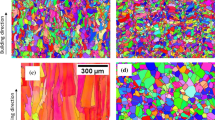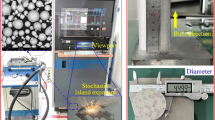Abstract
The present study examined the effect of tool pin profile on the microstructure and mechanical properties of AA2219-T62/Incoloy 800 joints produced using FSW at a fixed rotational speed of 500 rpm. The developed weld joints were studied for microstructure using an optical microscope, electron backscattered diffraction, a scanning electron microscope, X-ray diffraction, and transmission electron microscope. The microstructural results revealed significant grain refinement in the weld zone, X-ray diffraction, and transmission electron microscope results revealed the presence of the Fe3Al phase. Weld joints produced with a tungsten carbide tool with a cylindrical (10°) taper have a maximum hardness of 130 HV and a tensile strength of 320 MPa. Weld joints produced with other tool profiles resulted in lower tensile strength owing to the presence of defects similar to voids, surface tunnels, excessive flash, and end hole defects formed at the interface of AA2219-T62/Incoloy 800 joints.









Similar content being viewed by others
References
Abin A, Vaira Vignesh R, and PadmanabanGovindaraju R M, Mater Today: Proc 22 (2020) 3340. https://doi.org/10.1016/j.matpr.2020.03.297
Sai P, Balu T M B, Vaira Vignesh R, Chinta S, and Padmanaban R, Mater Today: Proc (2021). https://doi.org/10.1016/j.matpr.2020.12.340
Satish Kumar T, Nampoothiri J, and Shalini S, Silicon (2022). https://doi.org/10.1007/s12633-021-01597-0
Jojith R, and Radhika N, Silicon 12, (2020) 2073.
Shankar S, and Mohanraj T, J Balkan Tribol Assoc 23, (2017) 124.
Esmaeili A, Besharati Givi M K, and Zareie Rajani H R, Mater Sci Eng A. 528 (2011) 7093.
Yazdipour A, and Heidarzadeh A, J Alloys Compd (2016). https://doi.org/10.1016/j.jallcom.2016.03.307
Dressler U, Biallas G, and Mercado U A, Mater Sci Eng A 526 (2009) 113.
Uzun H, Dalle Donne C, Argagnotto A, Ghidini T, and Gambaro C, Mater Des 26 (2005) 41.
Rodriguez J, and Ramirez A J, Mater Charact 110 (2015) 126. https://doi.org/10.1016/j.matchar.2015.10.023
Liu Xun, Lan Shuhuai, and Ni Jun, Mater Des 59 (2014) 50. https://doi.org/10.1016/j.matdes.2014.02.003
Sina H, Corneliusson J, Turba K, and Iyengar S, J Alloys Compd 636 (2015) 261.
Yazdipour A, and Heidarzadeh A, Int J Adv Manuf Technol (2016). https://doi.org/10.1007/s00170-016-8705-2
Shahverdi H R, Ghomashchi M R, Shabestari S, and Hejazi J, J Mater Process Technol 124 (2002) 345.
Kar A, Kailas S V, and Suwas S, Trans Indian Inst Met 72 (2019) 1533. https://doi.org/10.1007/s12666-019-01643-x
Sunilkumar D, Mathew J, and Muthukumaran S, Trans Indian Inst Met 73 (2020) 1689. https://doi.org/10.1007/s12666-020-01984-y
Swamy M M, Muthukumaran S, and Kiran K, Trans Indian Inst Met 70 (2017) 1221. https://doi.org/10.1007/s12666-016-0916-6
Yoon T, Park S, Chung S, Noh J, Kim K, and Kang C, Metals Mater Int 22, (2016) 501. https://doi.org/10.1007/s12540-016-5620-x
Author information
Authors and Affiliations
Corresponding author
Ethics declarations
Conflict of interest
On behalf of all authors, the corresponding author states that there is no conflict of interest.
Additional information
Publisher's Note
Springer Nature remains neutral with regard to jurisdictional claims in published maps and institutional affiliations.
Rights and permissions
Springer Nature or its licensor (e.g. a society or other partner) holds exclusive rights to this article under a publishing agreement with the author(s) or other rightsholder(s); author self-archiving of the accepted manuscript version of this article is solely governed by the terms of such publishing agreement and applicable law.
About this article
Cite this article
Magesh, M., Sathiskumar, R. & Kumar, T.S. Effect of Tool Pin Profile on Grain Refinement, Microstructure, and Mechanical Properties of AA2219-T62/Incoloy 800 Joints Developed via Friction Stir Welding Process. Trans Indian Inst Met 77, 737–746 (2024). https://doi.org/10.1007/s12666-023-03154-2
Received:
Accepted:
Published:
Issue Date:
DOI: https://doi.org/10.1007/s12666-023-03154-2




